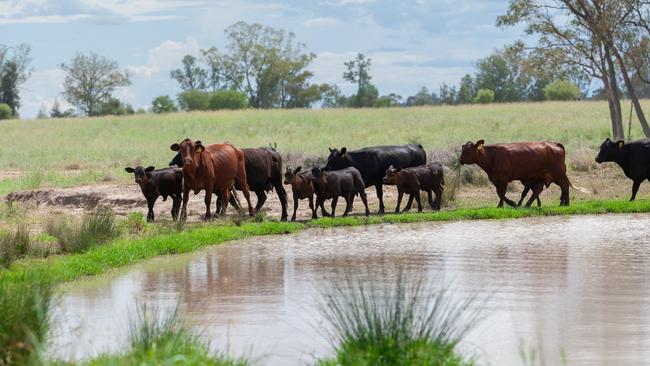Anti-meat activists using dietary guidelines to further their agenda, industry says
It accounts for about $75bn in economic turnover and employs close to a half-million people, but Australia’s red meat sector fears updates to the country’s official dietary guidelines are just the latest agenda-driven attack on the industry.

It accounts for about $75bn in economic turnover and employs close to a half-million people, but Australia’s red meat sector fears updates to the country’s official dietary guidelines are just the latest agenda-driven attack on the industry.
Red meat lobby groups say the ongoing federal government-backed review of the Australian dietary guidelines, which are renewed about once a decade, has been infiltrated by anti-meat zealots who are fixated on forcing a plant-based diet on the population and are using climate change as a foil to reach their goal.
The announcement in a communique released in late January by the statutory National Health and Medical Research Council that the official dietary guidelines were being updated to incorporate environmental sustainability messaging came as a surprise to most Australians, who presumed the recommendations would be based solely on the nutritional needs of human beings.
The red meat sector argues it goes beyond the remit of the 10-person dietary guidelines expert committee, risks undermining the work of farmers to reduce carbon emissions and creates distrust among the public.
Prominent Australian red meat researcher Rod Polkinghorne says diet and sustainability are different issues and should be treated as such.
“Diet should be about being healthy or not healthy,” Polkinghorne tells Inquirer.
On the other side of the debate, Curtin University professor of sustainability Dora Marinova says updating the guidelines to include sustainability is in line with other countries.
“I think it’s appropriate because you cannot have a healthy human species while the rest of the environment is deteriorating,” she says.
Everyday Australians, who are the third biggest consumers of meat per capita in the world, have been left wondering about the future of the backyard barbecue and the prospective viability of beef and lamb production, which sustains vast parts of rural Australia.
It raises the question: where did the push to include environmental sustainability in dietary guidelines come from?
The NHMRC tells Inquirer it was based on “stakeholder feedback” in surveys and recommendations from the little-known National Health and Climate Strategy, published by the federal Department of Health and Aged Care in December last year.

“Research has demonstrated that if population-level changes to diets were made to include no processed meat, small amounts of red meat, moderate amounts of other animal-sourced foods (poultry, fish and dairy) and generous amounts of fruits, vegetables, legumes and nuts, premature mortality could decrease by 19 per cent in 2030, and also contribute to reducing food-related greenhouse gas emissions,” the strategy says.
It’s familiar territory for the frustrated red meat sector, which the UN’s Food and Agriculture Organisation estimates accounts for about 12 per cent of global emissions.
Many scientists and research papers, widely reported in the media, suggest our hunger for red meat is destroying the planet and that it can be readily replaced by plant alternatives.
Anti-meat activists have seized on the studies to call for red meat to be taxed to subsidise vegetables and for governments to impose regulations on farmers that would ultimately lead to the reduction of herds.
Some would have us believe the science on the issue is settled.
Yet there is a large cohort of scientists who despair that the desire to prevent climate change has been hijacked by anti-red meat activists who have used what Kevin Rudd called “the great moral challenge of our generation” to advocate for the livestock industry to be downsized, if not eliminated.
They talk of large-scale tree clearing, methane-emitting faeces littering the earth, landscapes depleted of native wildlife and herds of cattle being fattened with grains and crops that otherwise could have gone to human consumption.
But anyone who has visited an Australian cattle station, particularly in the north, knows the above description bears little resemblance to the domestic beef industry.
Polkinghorne says the agenda against the red meat sector targets two fronts: health and environment.

A disputed Global Burden of Disease report published in The Lancet in 2019 claimed 896,000 deaths were caused by eating red meat – a 36-fold increase on the 25,000 deaths attributed in the previous 2017 iteration.
Despite serious concerns being raised about the study, by 2022 it had been cited by 635 documents, including 351 scientific papers and nine policy documents.
It’s what the red meat sector argues is a self-perpetuating cycle of anti-meat rhetoric.
While some research has found correlations between overconsumption of red meat and increased risk of developing colorectal cancer and type 2 diabetes, the 2013 dietary guidelines say up to 455g a week can be included as part of a healthy diet.
While some scientists suggest the nutritional benefits of red meat can be substituted by plant products, other research has highlighted the irreplaceable role of meat in the human diet and also proven a correlation between a lack of access to red meat and childhood stunting rates.
It’s clearly more complicated than a simple dietary switch.
“They’ll have a go at diet and when that doesn’t work they will have a go at the sustainability of it,” Polkinghorn says.
Like the dietary implications, the global scientific jury is still out on whether beef production, particularly using regenerative practices, is bad for the environment.
Some Australian graziers have been paid huge sums for the carbon credits generated by their ability to show how their production methods sequester carbon in the soil and produce a net reduction in carbon emissions.
Since 2022, more than 1000 global scientists have signed the Dublin Declaration, which says livestock systems are “too precious to society to become the victim of simplification, reductionism or zealotry”.
The declaration’s tone is jarringly different to the rhetoric of some scientists and institutions such as the World Health Organisation, which has called for more “plant-rich diets” to meet global emissions reduction targets.
Therein lies part of the problem with the NHMRC’s proposal to weave sustainability messaging into the dietary guidelines.
If the world’s top scientists cannot agree on whether red meat is good or bad for the planet, how can a committee of 10 Australians be expected to decide the matter?
And if the consensus is so elusive, should they be making decisions that could have such damaging consequences for a pillar of the Australian economy?
In an article published this week in the scientific journal Nature, Alice Stanton, a professor of cardiovascular therapeutics at the Royal College of Surgeons in Ireland, says many “recent very influential” reports underpinning public policy recommendations to reduce or exclude meat and dairy are problematic and potentially biased.
“They strongly suggest that these dietary shifts will not only benefit planetary health but also human health,” Stanton says.
“However … there are grounds for considerable concern in regard to the quality and transparency of the input data, the validity of the assumptions and the appropriateness of the statistical modelling used in the calculation of the global health estimates which underpin the claimed human health benefits.”
Stanton says blatant errors and limitations in reports have been acknowledged but not corrected by the authors.
“As a consequence, these reports continue to erroneously influence food policy decisions and international dietary guidelines,” Stanton says.
Marinova disagrees, describing the science as “categorical” in finding there is a huge difference between the environmental impact of plant and animal-based foods.
She argues the nutritional benefits of beef can be found in plant substitutes such as lentils and that there is a moral imperative to make dietary shift for the sake of the environment.
“Beef has serious implications for Australia because we keep clearing native vegetation to allow for cattle grazing,” she says.
“That’s in addition to the methane that ruminant animals emit, and this is really huge.
“If you compare this with lentils, lentils contribute to nitrogen fixation of the soil, so it is environmentally beneficial.”
Asked how a broadacre farm denuded of trees could compare environmentally to a rangeland cattle grazing operation in northern Australia, Marinova concedes some alternative methods to traditional broadacre farming, such as agroforestry, are preferable.
“Just because there is something wrong with (how we grow) plants doesn’t make meat better,” she says.
Polkinghorne says it’s important to consider the quality of nutrients provided by a food type when considering emissions generated.
Further, he says the quality of empiric evidence in favour of red meat is higher than the modelling used to make claims about high greenhouse gas emissions.
“The two things I’m concerned about in general is that we need to look at the high-quality evidence on diet and sustainability,” he says.
“When you look at both, and I have pretty extensively, the environmental story for ruminant livestock is pretty strong, anywhere in the world.
“The story for meat in a healthy diet is even stronger.”
Polkinghorne says the red meat sector has found itself in the position of countering “misinformation” because it previously ignored spurious claims made about it by “highly co-ordinated and funded” groups.
“I think our problem has been that we didn’t pay attention for 20 years,” he says.
“They’ve created a narrative and it’s been repeated enough and amplified enough on social media and Netflix movies that the average person in New York takes it as true.”
He blames films such as Netflix’s Cowspiracy, which is based on a fundamentally flawed premise that livestock production is responsible for 51 per cent of global emissions, for brainwashing young audiences into believing meat is bad for the planet.
Even children’s books showing what individuals can do to reduce their environmental footprint carry a message that they should eat less red meat.
Marinova says young people are indeed more aware about the effects of meat on the climate and their personal health.
She also says there is a “gender division” in Australia, “where it is considered that real men eat meat and vegetables are something females eat”.
“In reality, it doesn’t matter if we’re men or women, we all need the benefits of fibre,” Marinova says.
Dietitians Australia has been advocating for the integration of sustainability principles into the dietary guidelines for years, but the organisation says it may not come at the expense of red meat which, in Australia, is produced far more sustainably than in other parts of the world.
The group’s food and environment interest group co-convener Nicole Senior says the focus should be cutting back on over-processed “discretionary foods” – essentially junk food – which make up a third of Australian diets and can more readily be cut for better health and environmental outcomes.
“In one way I feel sorry for the red meat people because red meat has become like the whipping boy of the food sustainability movement, when the evidence suggests that it’s so much bigger than just how much meat we eat,” Senior says.
“We’re eating so many of those (discretionary foods) that have environmental impact as well, but they’re giving us nothing in return except for health problems.
“We know that it’s nutritionally amazing, lean red meat, and even for any environmental impact that it has, it’s giving us back a lot, which is more than can be said for all the discretionary foods that we eat.”
Central Queensland cattle grazier Mark Davie, who chairs the Australian Beef Sustainability Framework, says recommendations to curb emissions from the food sector should focus first on food waste which, if measured as a country, would be the world’s third biggest carbon emitter.
Davie says any official advice warning against beef production on the basis of sustainability will undermine the industry’s efforts to reduce emissions, including the millions of dollars poured into products such as asparagopsis seaweed, which can reduce methane emissions by up to 98 per cent.
“Why don’t the dietitians worry about diet and let our industry worry about what we are doing to reduce environmental impacts,” Davie says.
“I don’t think anyone has the knowledge to be able to accurately say that a certain food is worse for the environment than another.
“I don’t know where it will end up but I don’t understand how people can think it’s a good idea.”








To join the conversation, please log in. Don't have an account? Register
Join the conversation, you are commenting as Logout